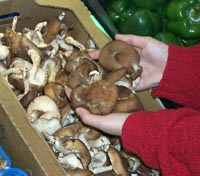Shiitake Mushroom Production Detailed in New Instructional Video
Shiitake Mushroom Production Detailed in New Instructional Video

Kentucky's millions of wooded acreages have the potential to generate many different forest products. One option that forest landowners are being urged to look at is shiitake mushrooms. Growing this type of mushroom can financially benefit the landowner and is an environmentally friendly practice.
"For owners of small woodlots who do a good job of determining the market for shiitake mushrooms," said Deborah Hill, University of Kentucky Extension forestry specialist. "It's one way to make their forested lands generate some income in a relatively short time period."
As with many agricultural crops, a number of management steps have been found that speed the growing process along and generate the best possible mushrooms. The UK College of Agriculture's Forestry department in cooperation with the Kentucky Department of Forestry has developed written instructions and a new video. These materials can be obtained through your local Cooperative Extension office and through the UK College of Agriculture web site.
Raising shiitake mushrooms can be environmentally friendly since growers are urged to use scrub hardwood trees and/or limbs from larger harvested trees as the growing medium.
"Experienced shiitake growers have found that natural logs yield a far better product than logs created from pressed sawdust," Hill said.
At one point, there was a philosophy among shiitake growers that only oak tree species were capable of growing shiitake mushrooms. Hill said research now suggests many other less desirable hardwood species provide a very good environment for this mushroom's development.
Beyond collecting the appropriate wood, a number of other management tips have been researched that will dramatically improve a grower's shiitake harvest numbers.
The seed of the mushroom is called spawn. Spawn comes in three forms and must be injected into the log for mushrooms to grow.
Inoculating the log requires a few special tools. Rubber gloves protect skin from long exposure to spawn and keep organisms on hands from contaminating the spawn. Alcohol sterilizes the drill bits used in creating the plug holes.
The amount of moisture in the log is crucial to production. Moisture allows the inoculums to properly spread. The log must have a moisture content of around 30 percent during the entire process. Hill said sprinkling devices are usually needed to keep the logs moist.
Growing mushrooms also requires patience. After the mushrooms are inoculated they must be incubated for six to 18 months. During the incubation process the logs need 80 to 90 percent shade and ideally should be kept in wooded areas. If a wooded area is not available, shade cloths are a good alternative.
Mushrooms are ready to harvest when they have a rounded cap two-to-three inches in diameter. Shiitakes can be stored in a refrigerator for about two weeks. They also can be dried and kept up to six months without losing their flavor.
"Shiitake mushrooms can be found in many large grocery stores and in most if not all the large urban markets across the U.S.," Hill said. "These mushrooms are a healthy food choice and contain most of the essential daily vitamins."
Each Kentucky county Extension office can receive a copy of the video Growing & Marketing Shiitake Mushrooms on Natural Logs. It also is available from the University of Kentucky Cooperative Extension Service for $20 on VHS and $25 on DVD. Kentucky residents must include six percent sales tax. Send a check payable to the University of Kentucky to: Agricultural Communications Services, Instructional Video Library, 131 Scovell Hall, Lexington, KY 40546-0064.
Publications on Shiitake Mushrooms are available from the UK College of Agriculture website http://www.ca.uky.edu/agc/pubs/agpubs.htm. Some publication titles include FOR-85 Harvesting, FOR-82 Log Moisture Content Monitoring, FOR-80 Spawn Selection, FOR-77 Shiitake Production on Logs: Step-by-Step in Practices.
